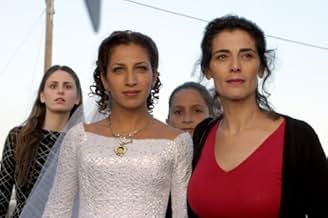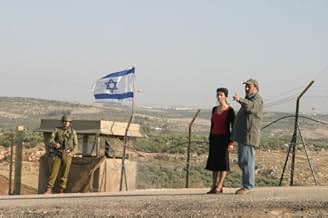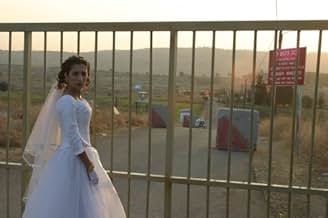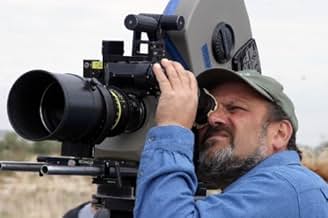Aggiungi una trama nella tua linguaIn Majdal Shams, the largest Druze village in Golan Heights on the Israeli-Syrian border, the Druze bride Mona is engaged to get married with Tallel, a television comedian that works in the ... Leggi tuttoIn Majdal Shams, the largest Druze village in Golan Heights on the Israeli-Syrian border, the Druze bride Mona is engaged to get married with Tallel, a television comedian that works in the Revolution Studios in Damascus, Syria. They have never met each other because of the occup... Leggi tuttoIn Majdal Shams, the largest Druze village in Golan Heights on the Israeli-Syrian border, the Druze bride Mona is engaged to get married with Tallel, a television comedian that works in the Revolution Studios in Damascus, Syria. They have never met each other because of the occupation of the area by Israel since 1967; when Mona moves to Syria, she will lose her undefi... Leggi tutto
- Regia
- Sceneggiatura
- Star
- Premi
- 8 vittorie e 15 candidature totali
- Amal
- (as Hiyam Abbass)
- Hammed
- (as Makram J. Khoury)
- Marwan
- (as Ashraf Barhoum)
- Evelyna
- (as Evelyne Kaplun)
- Amin
- (as Adnan Trabshi)
- The Mother
- (as Marlene Bajjali)
- Simon
- (as Uri Gabriel)
- Joseph
- (as Robert Hoenig)
Recensioni in evidenza
Co-writers Suha Arraf (a Palestinian journalist) and Israeli director Eran Riklis pile almost too much on to this one Druze (Israeli Arab) family living in the occupied Golan Heights in order to make the personal political. The tensions, poignancy and symbolism of a wedding are heightened because when this bride leaves her home for her arranged marriage with a Syrian celebrity, she will not be able to return home.
Every complicated character has a complicated background, whether theirs or their parents' politics or their religiosity or their dress or their educational or romantic aspirations-- and is in a complicated relation to every other character and the authorities.
In addition to the return of prodigal sons from overseas, the larger community intrudes on the intra-family tensions, from robed tribal elders and the police who each bring warnings of proper behavior to a comical videographer. My dependency on English subtitles lessened some of the impact of hearing characters switch from Arabic to Hebrew to French to Russian to English to communicate, as part of the interactions are based on who can understand different languages and who can't. This complex in-gathering all symbolically happens the same day as a demonstration in support of the change over of power in Syria from the father the dictator to the son, while a flat tire leads to a crucial delay. The ubiquitous television, and government attention, however, is focused on the West Bank, making this border a forgotten zone as well as a no (wo)man's land.
What makes it all hang together amidst this human comedy is the central focus from the start to the finish on the almost silent bride, dressed in Western white, and her more verbal older sister, rebelliously in slacks, and both played by powerful actresses. Each has made choices in the past they regret and each chooses their future now, despite the efforts of all their male relatives, let alone global politics, to thwart them and make them helpless.
Even with the heavy-handed baggage of all the "Crash"-like coincidences, the film beautifully makes the point that politics isn't just ideology but affects how people get on with the basics of their lives.
The Druze are a minority within a minority. Most of them consider themselves Arab, but they are not truly Muslim--they have their own religion and their own rituals. Some Druze have more or less integrated themselves into Israeli society, but the family portrayed in the movie consider themselves Syrian. They demonstrate solidarity with the Syrians whom they can see and hear across the border. However, crossing the border into Syria is difficult, and returning is impossible.
While the Israelis and the Syrians soldiers eye each other with hostility across the barbed wire, Amal, a young woman--the very beautiful Hiam Abbass--is attempting to cross from the Golan Heights into Syria to marry a man she has never met. Because of the regulations, she will never see her family again. This sad and bizarre situation is played out against a backdrop of family antagonisms, bureaucratic incompetence, and petty malevolence. Amal's father Hammed--Makram Khoury--has to walk a fine line between saying goodbye to his daughter and resisting the Israeli military attempts to silence him. Hammed's other daughter, Mona--played by Khoury's real-life daughter Clara Khoury--is trapped in a loveless marriage, and is trying to simultaneously comfort her sister and achieve her own independence.
Nothing goes right, despite the efforts of a harassed U.N. official, who has seen her share of bizarre border incidents and by now has apparently accepted as commonplace the absolute madness taking place all around her.
There were a few comic elements in the movie, but I see it as a tragic film about a tragic situation. "When kings fall out, poor people tremble." The characters in this film are trapped in a toxic situation that they didn't create and can't control. As always, the wars of bullets and of words play themselves out in the lives of people who are simply trying to lead a reasonably normal and happy life.
"The Syrian Bride" was a surprise. Directed with honesty by Eran Riklis, who also co-wrote the screen play with Suha Arraf, the film takes no sides between one faction, or another. In many ways, the movie seems to be sympathetic toward the Druze family, but in no way it felt preachy, or frankness in its presentation of what goes on in that troubled part of the world.
The family at the center of the story is not a happy one. The father, Hammed, has been in prison for his pro-Syrian views. He has also estranged himself from his two sons, Hattem, who has married a Russian doctor and now lives abroad and Marwan, a businessman of sorts, based in Italy. The oldest daughter, Amal, a sensitive woman, has a troubled marriage herself to a man who can't understand her need to assert herself and go to college. It is a male dominated society where women don't seem to have much to contribute except have children and be housewives.
Most impressive in the film is Hiam Abbass, an actress we have admired from her previous work, notably, "Satin Rouge" and "Paradise Now". She has a quiet way of getting under the skin of the role she is playing; this woman shows such dignity in her work that it's hard to take ones eyes from her once she is on the screen. Makram Khoury is seen as the patriarch, Hammed. Clare Khoury is also effective as the bride who must leave family and friends to go to another world. Eyad Sheety and Ashraf Barhom play the two brothers.
"The Syrian Bride" is a satisfying film by Eran Riklis, a talented director who shows great sensibility toward the material.
In the sixth sense (which, let me state right now, has nothing to do with this film in any way, shape or form) one must ponder of serious holes in the plot. Holes that if considered, make the movie completely incoherent. I won't get into detail because I don't want to spoil the movie for the three remaining people who hadn't seen it yet.
The Syrian bride revolves around Amal, a Druze woman in Majd Alshams, a pro-Syrian village that is located in the Golan heights (I'll get into the pro-Syrian and pro-Israeli Druze villages later on). Amal is about to marry a local Syrian celebrity, whom she saw only in the soap-comedy he stars in. This wedding is more than just a plain wedding, it's the last time she will see her family because once she crosses the border and receives the Syrian citizenship, she will never see her family again (unless they meet on a neutral turf such as abroad- Hole No.1). It goes without saying that this fact makes the event a bittersweet one. To make matters worse, the family, already morose over parting with Amal for good (if you disregard the plot hole) has to deal with the feud between the father, a conservative man who brushed with the wrong side of the law (for ideological reasons I couldn't fathom) and his son who was banned by the village elderly for marrying a Russian foreigner.
The wedding brings together the family of the estranged son, his hot-shot, teeth-gapped (a crucial fact in the film) womanizing brother, Marwan and his sister, Mona (Klara khouri in a great performance) a strong willed woman that fights for her independence as well as the one of her teenage daughter. A fight amidst a conservative society that still attributes female independence with male incompetence.
The family's inner "demons" cease to be its major problem when upon escorting the bride to the border, the family faces the weenie Israeli bureaucrat and the ridiculously stubborn Syrian bureaucrat preventing the bride from crossing the border and uniting with her future husband.
The story is essentially a personal one when the political atmosphere plays as an intensifier. The Pro-Syrian Druze who are protesting against the Israeli occupation and for Bashar Elasad (who occupies Lebanon till today, Plot hole No. 2) are in a constant conflict between the country they feel they belong to and the country they currently reside in (as opposed to the Pro-Israeli Druze who serve in the Israeli army and show a remarkable awe-inspiring loyalty to Israel that I rarely witness).
Conflicted emotions, both political and personal, dictate the entire film and with a sometimes over simplified but altogether credible script and with a subtle direction that depicts very authentically (or at least seemingly authentic to the Jewish viewer such as yours truly), the movie creates the emotional effect that transcends the political agenda its based on.
As another reviewer pointed out, this film is the example of the drastic improvement that Israeli films went through the last couple of years when the personal movies became top priority and not the political ones. This movie is a completion of the process by combining the two ganres successfully (once you disregard the holes) to make a film that people can isolate themselves from its ideology and enjoy its overall undeniable,qualities which is, as you probably have guessed, what I did.
9 out of 10 in FilmOmeter.
Lo sapevi?
- QuizMakram Khoury and Clara Khoury are father and daughter in the film as well as in real life.
- BlooperMona's father says he has raised her for 25 years. However, she states her birth date as November 30th 1976 and the movie is set on July 17th 2000. That would make her only 23 years old.
- ConnessioniFeatured in The Making of The Syrian Bride (2005)
- Colonne sonoreBride Theme
Music Composed & Conducted by Cyril Morin
Performed by Bulgarian Symphony Orchestra-Sif 309
I più visti
- How long is Syrian Bride?Powered by Alexa
Dettagli
- Data di uscita
- Paesi di origine
- Siti ufficiali
- Lingue
- Celebre anche come
- Syrian Bride
- Luoghi delle riprese
- Aziende produttrici
- Vedi altri crediti dell’azienda su IMDbPro
Botteghino
- Lordo Stati Uniti e Canada
- 380.505 USD
- Fine settimana di apertura Stati Uniti e Canada
- 7235 USD
- 20 nov 2005
- Lordo in tutto il mondo
- 1.522.967 USD
- Tempo di esecuzione1 ora 37 minuti
- Colore
- Mix di suoni
- Proporzioni
- 2.35 : 1
Contribuisci a questa pagina

































